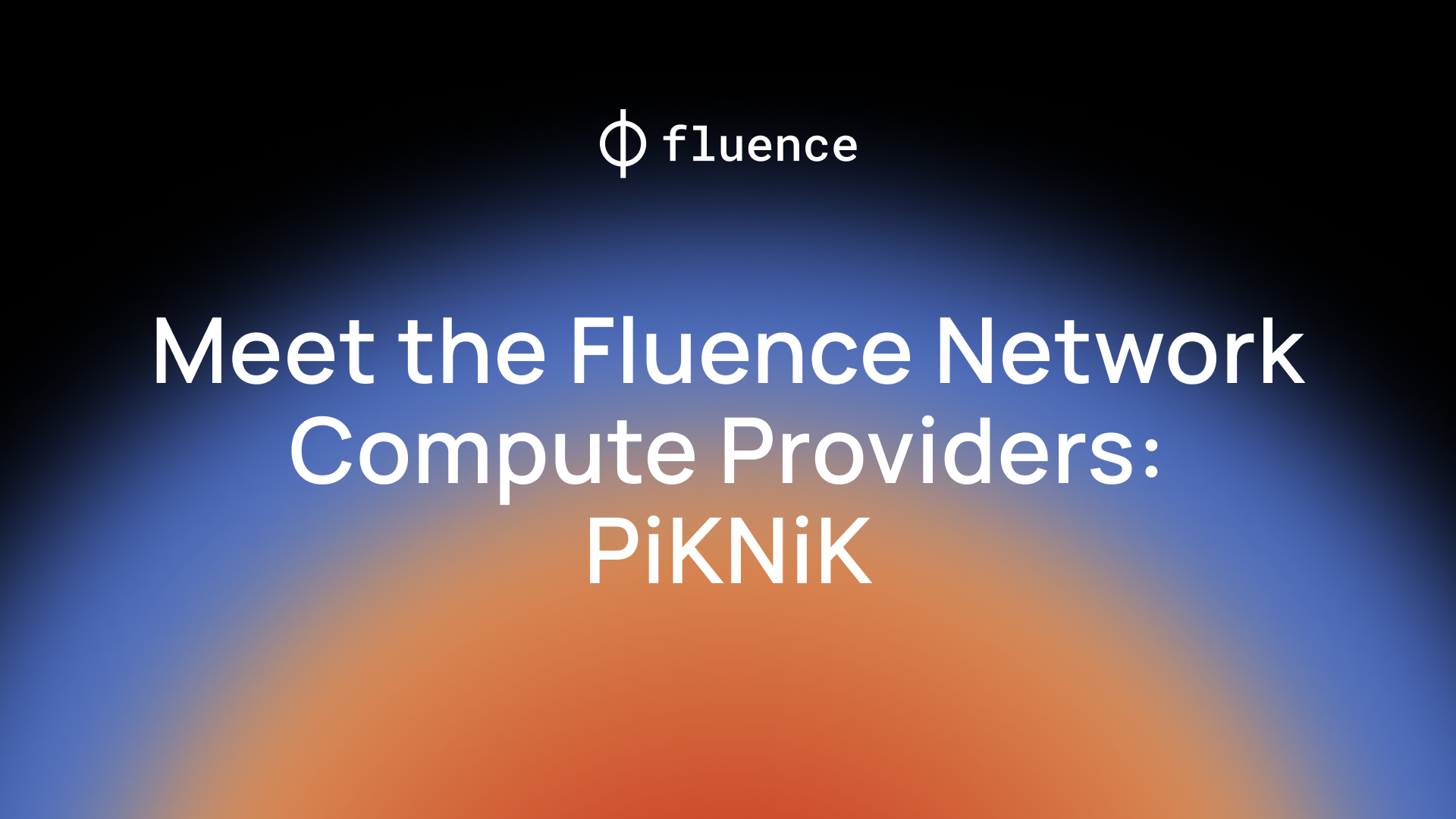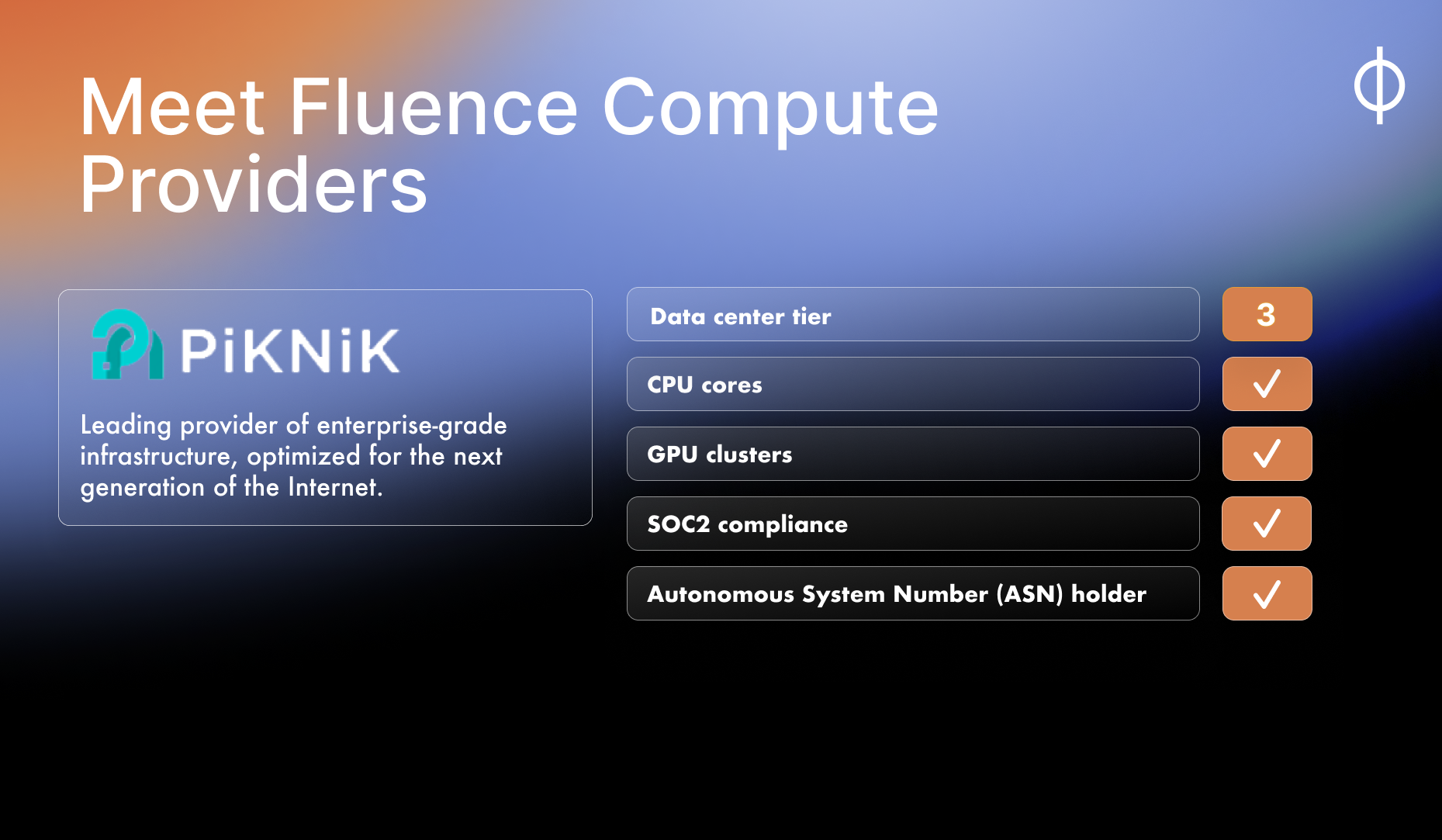Meet Fluence Compute Providers: PiKNiK

Following the launch of the compute marketplace in March, on September 20th we opened FLT Staking to the general public, taking another step closer towards creating a cost-effective, enterprise-grade compute platform readily available to companies anywhere in the world. We are now scaling the network step by step, continuously onboarding new capacity provider partners and increasing server availability.
Fluence has been collaborating with a select group of leading compute providers who bring substantial resources and expertise to the table. Our platform enables compute providers to rent out leading edge, enterprise-grade hardware via the Fluence marketplace. These partnerships ensure a robust and reliable foundation for the marketplace, which provides seamless access for customers to best DePIN compute resources at prices up to 80% lower than existing cloud hyperscalers.
In this blog post series, we would like to introduce PiKNiK, provider of enterprise-grade server resources, that has been supporting the Fluence Network from the very beginning.
We asked Benjamin Hoejsbo, VP of Technology at PiKNiK, to tell us more about their vision and our collaboration.
***
Why did you choose to join the cloudless movement & Fluence?
BH: Fluence has a promising vision, and PiKNiK supports the goal of reducing the world’s dependence on a few, very powerful hyperscalers. We find the Fluence software stack compelling, particularly in how it incentivizes committed capacity while ensuring that real client work on the network is always prioritized.
What are the strategic and business advantages that working with Fluence is bringing to your company? What do you value about Fluence? What makes the protocol appealing or unique?
BH: As a compute provider, PiKNiK naturally seeks to optimize hardware utilization and maximize the value of our available resources. Fluence offers a unique approach by combining revenue from compute jobs with a capacity reward. This ensures that providers are not wasting valuable hardware resources by running idle while waiting for the next job to offset costs. It’s an effective way to bootstrap the network and maintain a proper ratio of availability, which is crucial for attracting clients with larger requirements.
What was your infrastructure set up before joining Fluence?
BH: PiKNiK was founded in the Web3 storage space, which is highly compute-intensive. Our Filecoin sealing hardware, equipped with massive CPU cores and maxed-out RAM configurations, aligns perfectly with Fluence’s compute requirements, making it easy to run Fluence on our idle hardware resources. Additionally, PiKNiK operates large GPU clusters, which we are excited to offer as part of the DePIN ecosystem in the future.
Describe what your infrastructure, location and operations look like now. Anything special stands out, e.g., green data center, SOC2 or ISO27001 compliant?
BH: PiKNiK has invested significant effort into obtaining SOC2 certification, which is highly valued by our customers. While Blockchain, DePIN, and Web3 inherently address certain aspects of provider-customer transactions, they don’t cover everything, so compliance remains an important focus. We’ve found SOC2 certification to be a compelling selling point for both Web3/DePIN customers and traditional IaaS clients. Our hardware is located in a Tier 3 data center, a highly reliable and secure facility that provides excellent uptime and redundancy.

How do you see the DePIN space and your role in it now? How about in 5 years?
BH: At PiKNiK, we believe we are only at the beginning of the DePIN journey. The demand from customers who reject the lock-in business model of traditional centralized cloud providers is growing rapidly, and DePIN is emerging as a viable alternative. We are confident that traction will accelerate even further as features and usability continue to improve in the DePIN space.
Finally, what is your advice for any company out there considering joining Fluence?
BH: DePIN is gaining momentum, and Fluence offers something valuable for both potential providers and consumers. We recommend that anyone seeking cloud alternatives explore Fluence and discover what can be offloaded into a fair and decentralized marketplace for accessing compute power.
What's next?
- To start staking, secure an NFT from the Fluence NFT marketplace and head to our Staking App.
- Find out more details on FLT staking in this blog post.
- To join our provider network waitlist, click here.

